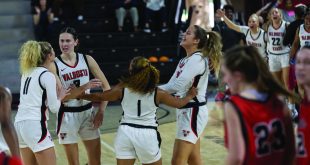Written by: Eric Jackson
Sigh…
If motivating students to join student organizations wasn’t hard enough, it has suddenly just become harder.
Student Life is making a counterproductive move by choosing to enforce the 2.5 minimum GPA required for executive members starting next semester.
To this point, the regulation has been on the books but not enforced.
We can only assume what the administration motives are surrounding this however, they do not outweigh the potential setback organizations will face trying to replace those members.
Obviously, these particular students may not be ahead in the classroom, but they are vital contributors to their groups.
Regular members (who are to maintain 2.0) with low GPA’s are undoubtedly more vulnerable to be less enthusiastic about committing to an organization, knowing the trivial obstacle facing them if they want to be promoted to a leadership position.
The Spectator, for example, is burned in return as our executive members (editors) are forced to resign due to GPAs that waver on the line.
Did these members, who are committed to spending hours in the office putting together a paper and reporting around campus, see it coming? No way.
The short notice for this change is baffling, especially with the fact that significantly increasing GPA in one semester is highly unlikely.
Those editors just like other departing executive members in other organizations leave now not because of lack of qualification or dedication.
For better or for worse, students who do not meet the requirement are being denied the opportunity to enhance their resumes with respected leadership roles.
Is a student who has less than a 2.5 GPA any less qualified to make a difference on campus through an organization than a student who has a 2.5 or above?
What about those with a 2.4? If they can graduate with that average, why not let them participate?
Students shouldn’t be deprived of what they pay for in student activity fees because administration feels that raising the minimum is beneficial.
Since when can’t average students be superior in something they are passionate about?
Many student organization leaders will attest that being a leader and a student is a balancing act. We spend hours dedicating our time to our members, fellow leaders and the service we provide to the university.
For many of leaders, like the editors at The Spectator, students who take on the executive roles are wholeheartedly committed. We are the members who found our place of belonging, our niche, with the organization of our choice.
And for many organizations such as The Spectator, BlazeFM, SGA and others not mentioned, this is our chance to have hands-on experience in a field we want to be members of later in our careers.
Without the chance to have this hands-on experience, holding a diploma alone will not guarantee us jobs.
It is work outside of the classroom that will help us when we compete for jobs after graduation.
We understand the value of our educations, and the importance of our professors’ time spent teaching us in the classroom.
But as executive members of a student organization, we also value our time as leaders and the work to which we have devoted countless sleepless nights.
 The Spectator The independent student newspaper of Valdosta State University
The Spectator The independent student newspaper of Valdosta State University





